











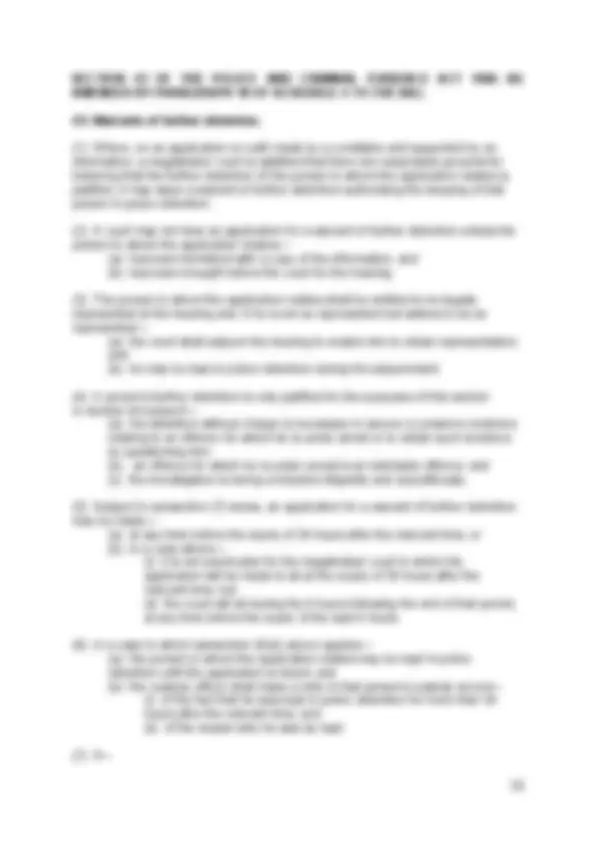
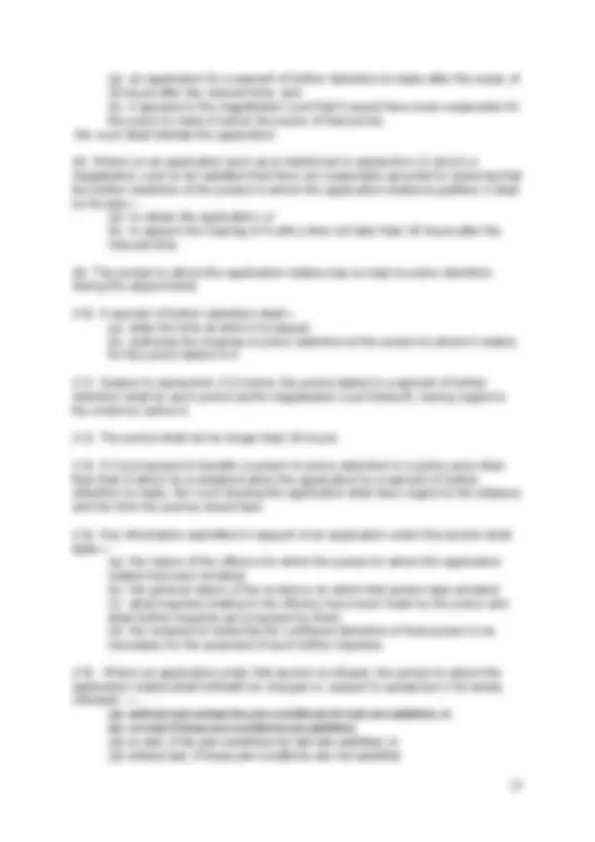











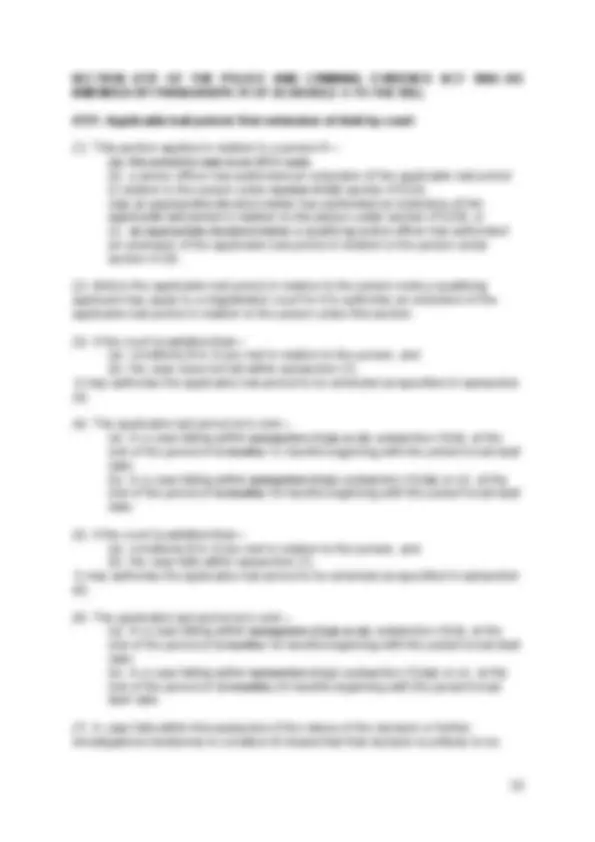



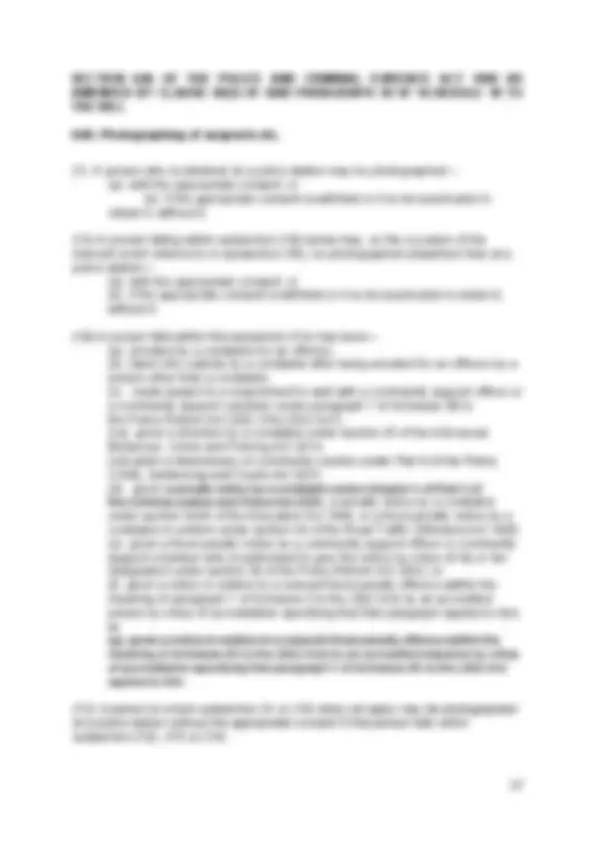
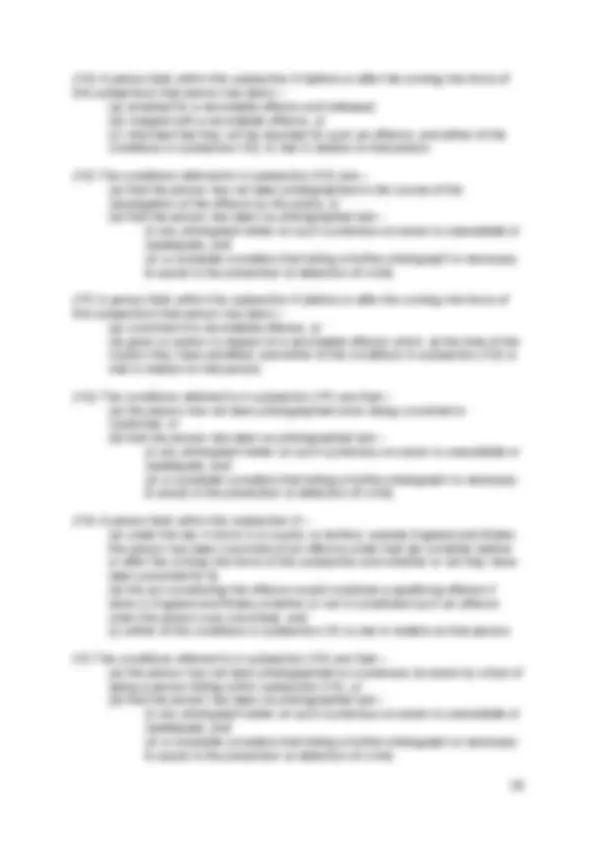
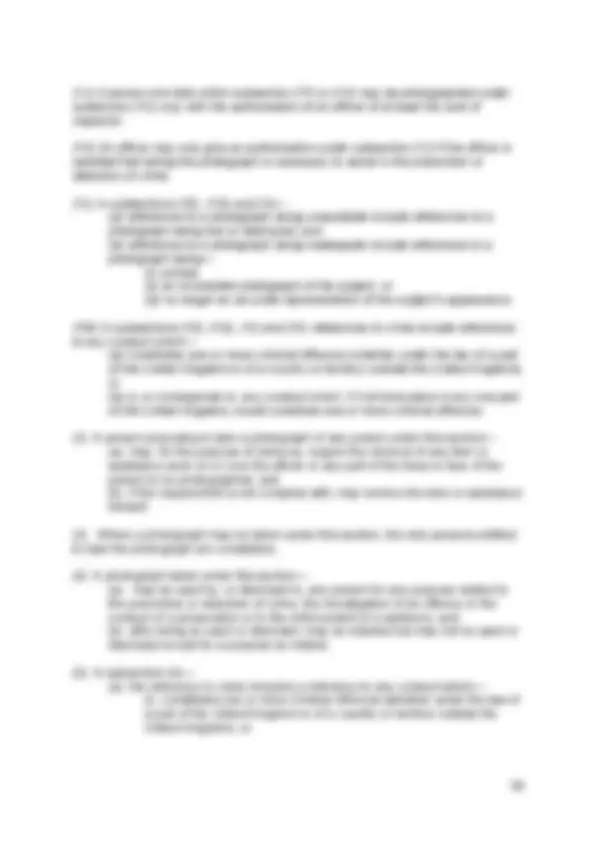


























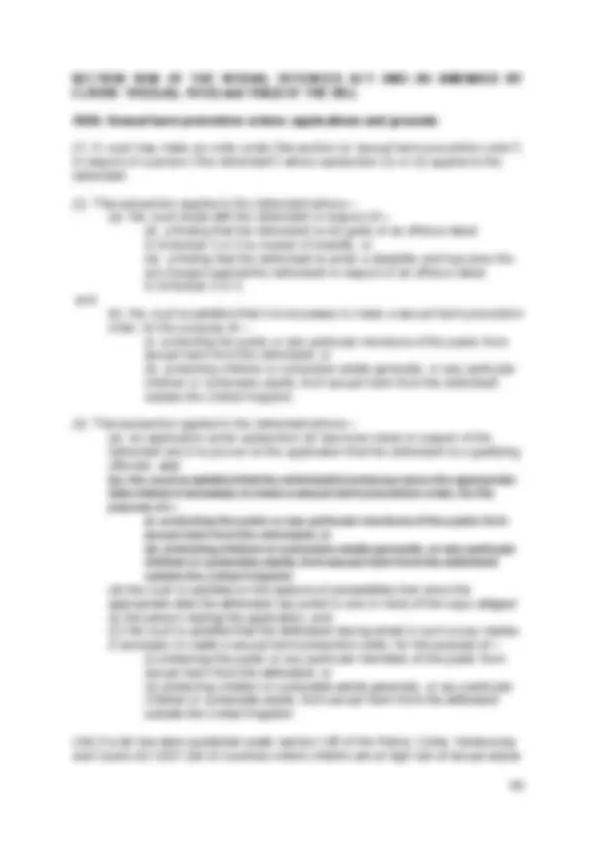


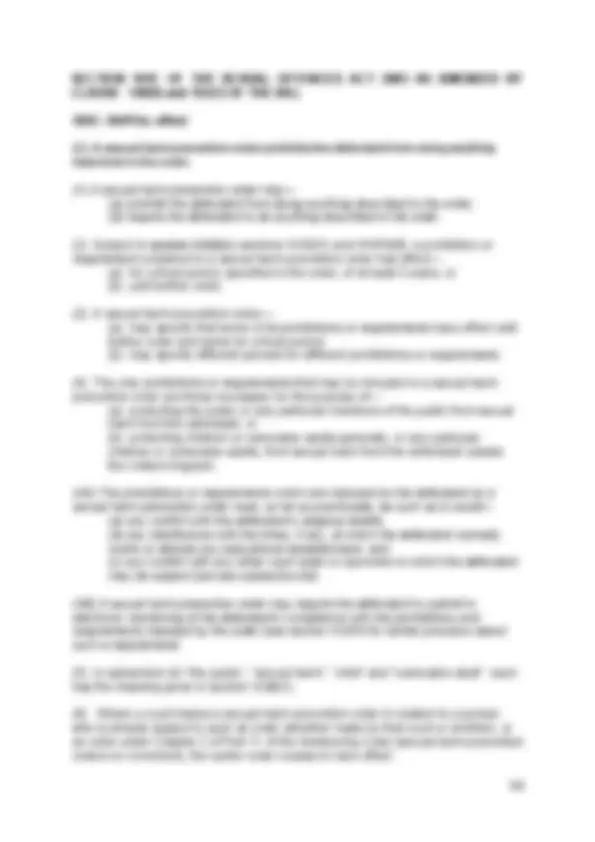
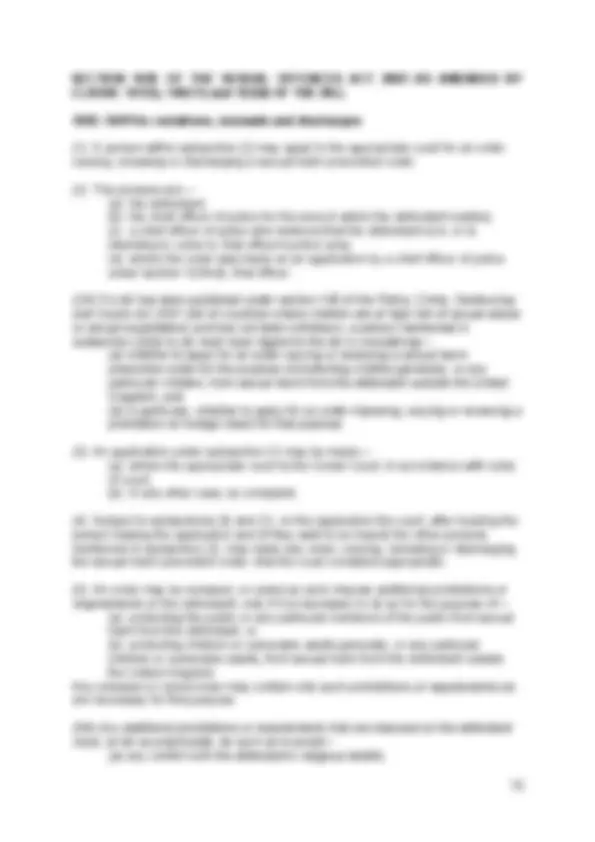











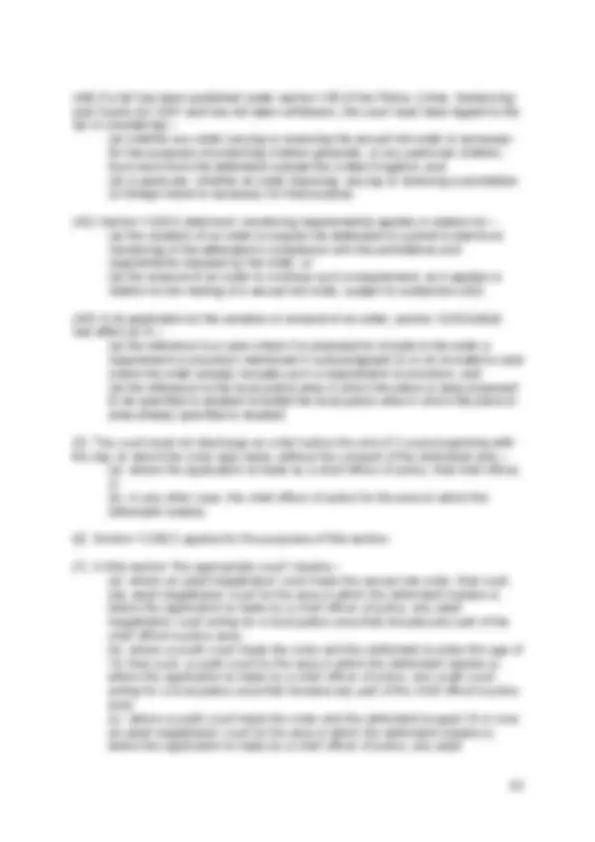

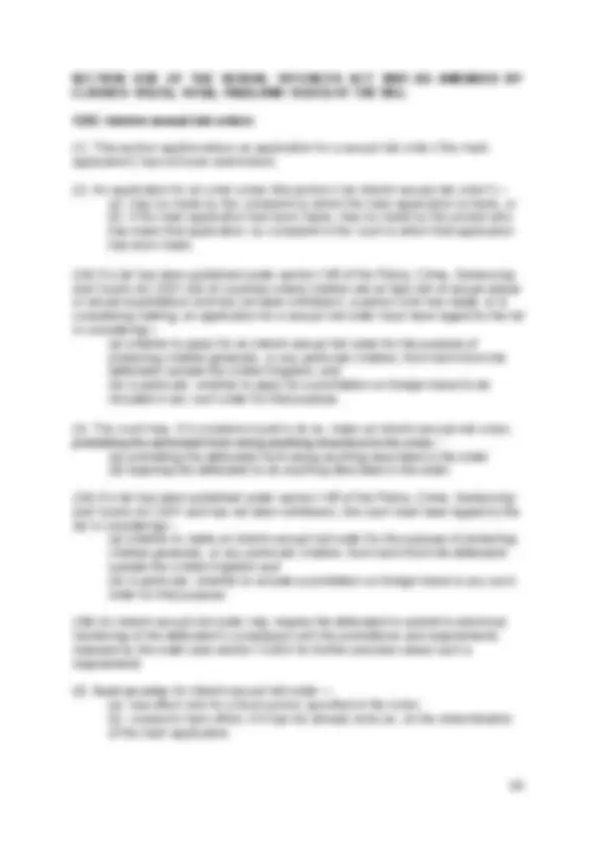



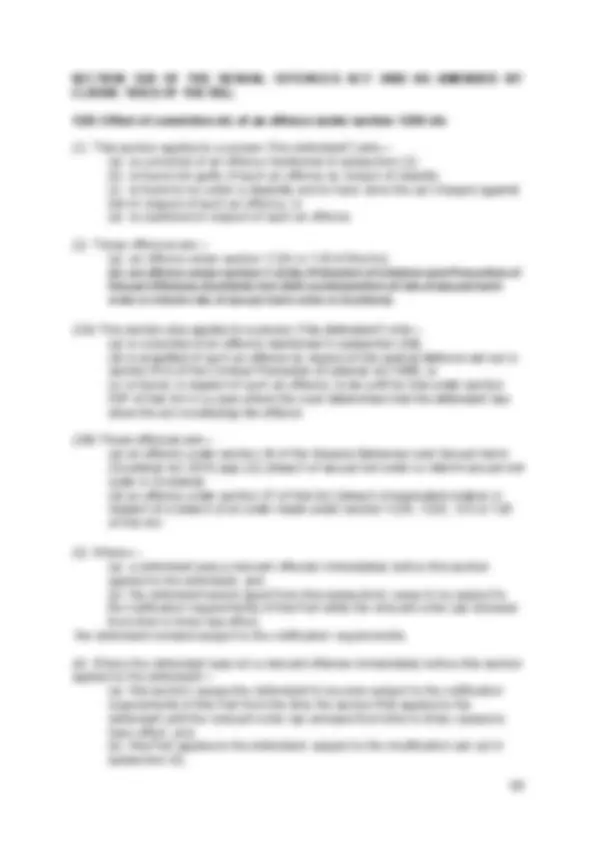


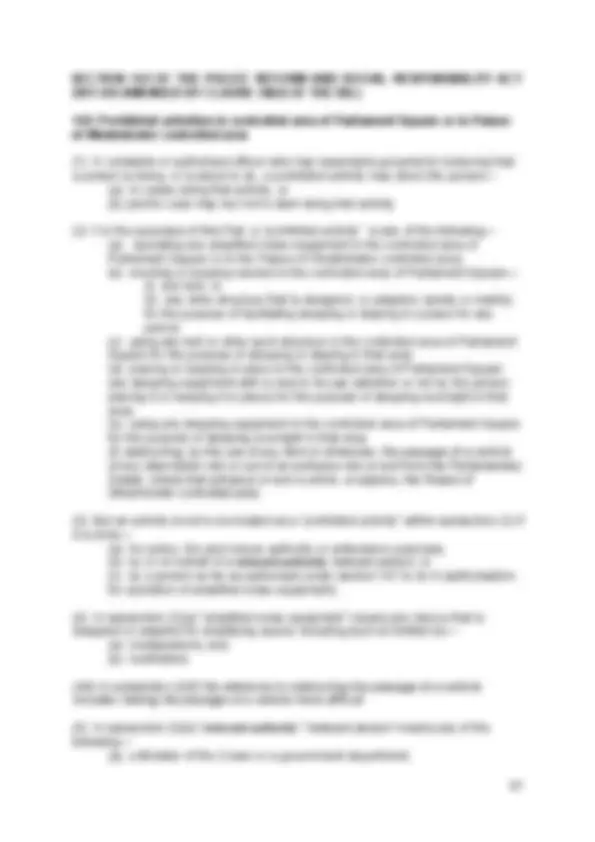

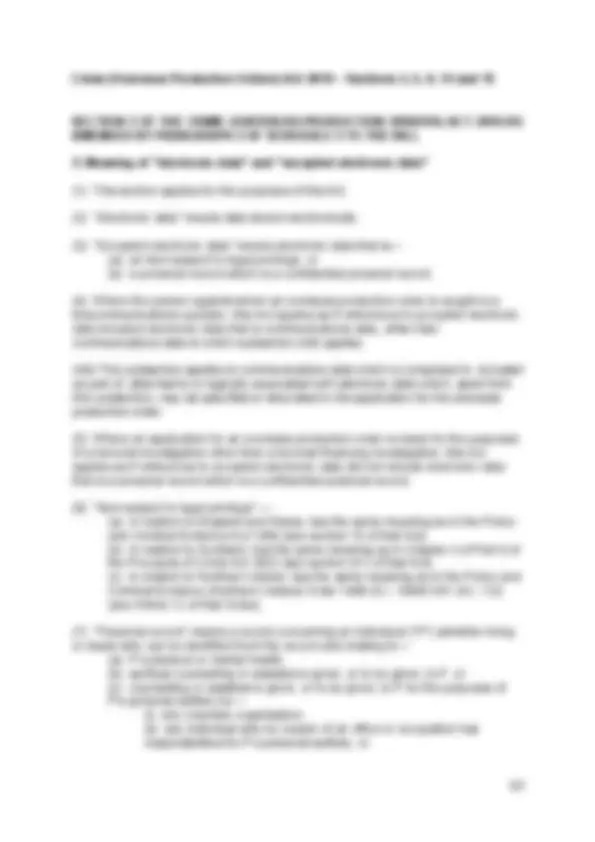









Study with the several resources on Docsity

Earn points by helping other students or get them with a premium plan


Prepare for your exams
Study with the several resources on Docsity

Earn points to download
Earn points by helping other students or get them with a premium plan
Community
Ask the community for help and clear up your study doubts
Discover the best universities in your country according to Docsity users
Free resources
Download our free guides on studying techniques, anxiety management strategies, and thesis advice from Docsity tutors
An in-depth analysis of Section 30A of the Police and Criminal Evidence Act 1984, which outlines the procedures for releasing a person arrested and granting bail. The section covers various conditions and exceptions, including the role of the custody officer, the Director of Public Prosecutions, and extensions of the applicable bail period. The document also includes definitions of relevant terms and exceptions for common land, vehicles, and trespassing.
What you will learn
Typology: Exercises
1 / 100

This page cannot be seen from the preview
Don't miss anything!





























































































This document shows provisions in other enactments as they would be amended by the Bill. It is intended to assist the consideration of these provisions in the Bill and should not be taken as a definitive statement of the law as it would have effect on the enactment of the Bill.
Deletions are shown struck through and additions in italics.
Index
Police and Criminal Evidence Act 1984 – Sections 30A, 30B, 34, 36, 37, 37CA, 37D, 41, 42, 43, 44, 47, 47ZB, 47ZC, 47ZD, 47ZE, 47ZF, 47ZM, 50A and 64A and paragraph 16 of Schedule 2A..................................................................................... 2
Public Order Act 1986 – Sections 12 and 14............................................................ 42
Road Traffic Act 1988 – Sections 2A and 3ZA ......................................................... 50
Criminal Justice and Public Order Act 1994 – Section 61, 62, 62B and 68 .............. 54
Sexual Offences Act 2003 – Sections 14, 87, 103A, 103C, 103E, 103F, 103I, 103J, 122A, 122B, 122D, 122E, 122H and 122I ................................................................ 64
Police Reform and Social Responsibility Act 2011 – Sections 142A and 143 .......... 90
Crime (Overseas Production Orders) Act 2019 – Sections 3, 5, 9, 14 and 15 ......... 93
Police and Criminal Evidence Act 1984 – Sections 30A, 30B, 34, 36, 37, 37CA, 37D, 41, 42, 43, 44, 47, 47ZB, 47ZC, 47ZD, 47ZE, 47ZF, 47ZM, 50A and 64A and paragraph 16 of Schedule 2A
30A: Release of a person arrested elsewhere than at police station
(1) A constable may release a person who is arrested or taken into custody in the circumstances mentioned in section 30(1)— (a) without bail unless subsection (1A) applies, or (b) on bail if subsection (1A) applies.
(1) If subsection (1A) applies, a constable may release on bail a person who is arrested or taken into custody in the circumstances mentioned in section 30(1).
(1A) This subsection applies if— (a) the constable is satisfied that releasing the person on bail is necessary and proportionate in all the circumstances (having regard, in particular, to any conditions of bail which would be imposed), and (b) a police officer of the rank of inspector or above a custody officer authorises the release on bail (having considered any representations made by the person).
(1B) In determining whether releasing the person on bail is necessary and proportionate in all the circumstances, the constable must have regard in particular to— (a) the need to secure that the person surrenders to custody, (b) the need to prevent offending by the person, (c) the need to safeguard victims of crime and witnesses, taking into account any vulnerabilities of any alleged victim of, or alleged witness to, the offence for which the person was arrested where these vulnerabilities have been identified by the constable, (d) the need to safeguard the person, taking into account any vulnerabilities of the person where these vulnerabilities have been identified by the constable, and (e) the need to manage risks to the public.
(1C) If subsection (1A) does not apply, a constable may release without bail a person who is arrested or taken into custody in the circumstances mentioned in section 30(1).
(2) A person may be released under subsection (1) or (1C) at any time before he arrives at a police station.
(3) A person released on bail under subsection (1) must be required to attend a police station.
30B: Section 30A: notices
(1) Where a constable releases a person under section 30A, he must give that person a notice in writing before he is released.
(2) The notice must state— (a) the offence for which he was arrested, (b) the ground on which he was arrested, and (c) whether the person is being released without bail or on bail.
(3) A notice given to a person who is released on bail must inform him that he is required to attend a police station.
(4) The notice must also specify— (a) the police station which the person is required to attend, and (b) the time on the bail end date when the person is required to attend the police station.
(4A) If the person is granted bail subject to conditions under section 30A(3B), the notice also– (a) must specify the requirements imposed by those conditions, (b) must explain the opportunities under sections 30CA(1) and 30CB(1) for variation of those conditions.
(6) The person may be required to attend a different police station from that specified in the notice under subsection (1) or to attend at a different time or an additional time
(6A) A person may not be required under subsection (6) to attend a police station at a time which is after the bail end date in relation to the person.
(7) He must be given notice in writing of any such change as is mentioned in subsection (6) but more than one such notice may be given to him.
(8) In this section "bail end date", in relation to a person, means the last day of the period of 28 days 3 months beginning with the day after the day on which the person was arrested for the offence in relation to which bail is granted under section 30A.
34: Limitations on police detention.
(1) A person arrested for an offence shall not be kept in police detention except in accordance with the provisions of this Part of this Act.
(2) Subject to subsection (3) below, if at any time a custody officer— (a) becomes aware, in relation to any person in police detention, that the grounds for the detention of that person have ceased to apply; and (b) is not aware of any other grounds on which the continued detention of that person could be justified under the provisions of this Part of this Act, it shall be the duty of the custody officer, subject to subsection (4) below, to order his immediate release from custody.
(3) No person in police detention shall be released except on the authority of a custody officer at the police station where his detention was authorised or, if it was authorised at more than one station, a custody officer at the station where it was last authorised.
(4) A person who appears to the custody officer to have been unlawfully at large when he was arrested is not to be released under subsection (2) above.
(5) A person whose release is ordered under subsection (2) above shall be released — (a) without bail unless subsection (5A) applies, or (b) on bail if subsection (5A) applies. (5) A person whose release is ordered under subsection (2) must be released on bail if subsection (5A) applies.
(5A) This subsection applies if— (a) it appears to the custody officer— (i) that there is need for further investigation of any matter in connection with which the person was detained at any time during the period of the person's detention, or (ii) that, in respect of any such matter, proceedings may be taken against the person or the person may be given a youth caution under section 66ZA of the Crime and Disorder Act 1998, and (b) the pre-conditions for bail are satisfied.
(5AA) A person whose release is ordered under subsection (2) must be released without bail if subsection (5A) does not apply.
(5B) Subsection (5C) applies where— (a) a person is released under subsection (5) or (5AA) , and (b) the custody officer determines that—
36: Custody officers at police stations.
(1) One or more custody officers shall be appointed for each designated police station.
(2) A custody officer for a police station designated under section 35(1) above shall be appointed— (a) by the chief officer of police for the area in which the designated police station is situated; or (b) by such other police officer as the chief officer of police for that area may direct.
(2A) A custody officer for a police station designated under section 35(2A) above shall be appointed— (a) by the Chief Constable of the British Transport Police Force; or (b) by such other member of that Force as that Chief Constable may direct.
(3) No officer may be appointed a custody officer unless the officer is of at least the rank of sergeant.
(4) An officer of any rank may perform the functions of a custody officer at a designated police station if a custody officer is not readily available to perform them.
(5) Subject to the following provisions of this section and to section 39(2) below, none of the functions of a custody officer in relation to a person shall be performed by an officer who at the time when the function falls to be performed is involved in the investigation of an offence for which that person is in police detention at that time.
(6) Nothing in subsection (5) above is to be taken to prevent a custody officer— (a) performing any function assigned to custody officers— (i) by this Act; or (ii) by a code of practice issued under this Act; (b) carrying out the duty imposed on custody officers by section 39 below; (c) doing anything in connection with the identification of a suspect; or (d) doing anything under sections 7 and 8 of the Road Traffic Act 1988.
(7) Where an arrested person is taken to a police station which is not a designated police station, the functions in relation to him which at a designated police station would be the functions of a custody officer shall be performed— (a) by an officer who is not involved in the investigation of an offence for which he is in police detention, if such an officer is readily available; and (b) if no such officer is readily available, by the officer who took him to the station or any other officer.
(7A) Subject to subsection (7B), subsection (7) applies where a person attends a police station which is not a designated station to answer to bail granted under section 30A as it applies where a person is taken to such a station.
(7B) Where subsection (7) applies because of subsection (7A), the reference in subsection (7)(b) to the officer who took him to the station is to be read as a reference to the officer who granted him bail.
(7C) The reference to a custody officer in section 30A(1A)(b) includes a reference to an officer other than a custody officer who is performing the functions of a custody officer by virtue of subsection (4) above.
(8) References to a custody officer in section 34 above or in the following provisions of this Act include references to an officer other than a custody officer who is performing the functions of a custody officer by virtue of subsection (4) or (7) above.
(9) Where by virtue of subsection (7) above an officer of a force maintained by a local policing body who took an arrested person to a police station is to perform the functions of a custody officer in relation to him, the officer shall inform an officer who— (a) is attached to a designated police station; and (b) is of at least the rank of inspector, that he is to do so.
(10) The duty imposed by subsection (9) above shall be performed as soon as it is practicable to perform it.
(a) incapable of understanding what is said to him; (b) violent or likely to become violent; or (c) in urgent need of medical attention.
(6A) Subsection (6B) applies where— (a) a person is released under subsection (2) or (2A) , and (b) the custody officer determines that— (i) there is not sufficient evidence to charge the person with an offence, or (ii) there is sufficient evidence to charge the person with an offence but the person should not be charged with an offence or given a caution in respect of an offence.
(6B) The custody officer must give the person notice in writing that the person is not to be prosecuted.
(6C) Subsection (6B) does not prevent the prosecution of the person for an offence if new evidence comes to light after the notice was given.
(7) Subject to section 41(7) below, if the custody officer determines that he has before him sufficient evidence to charge the person arrested with the offence for which he was arrested, the person arrested— (a) shall be– (i) released without charge and on bail, or (ii) kept in police detention, for the purpose of enabling the Director of Public Prosecutions to make a decision under section 37B below, (b) shall be released without charge and without bail unless the pre- conditions for bail are satisfied, (c) shall be released without charge and on bail if those pre-conditions are satisfied but not for the purpose mentioned in paragraph (a), or (b) shall be released— (i) without charge, and (ii) if the pre-conditions for bail are satisfied, on bail, but not for the purpose mentioned in paragraph (a), (c) shall be released— (i) without charge, and (ii) if the pre-conditions for bail are not satisfied, without bail, or (d) shall be charged.
(7A) The decision as to how a person is to be dealt with under subsection (7) above shall be that of the custody officer.
(7B) Where a person is dealt with under subsection (7)(a) above, it shall be the duty of the custody officer to inform him that he is being released, or (as the case may be) detained, to enable the Director of Public Prosecutions to make a decision under section 37B below.
(8) Where— (a) a person is released under subsection (7)(b) or (c) above; and
(b) at the time of his release a decision whether he should be prosecuted for the offence for which he was arrested has not been taken, it shall be the duty of the custody officer so to inform him.
(8ZA) Where— (a) a person is released under subsection (7)(b) or (c), and (b) the custody officer makes a determination as mentioned in subsection (6A)(b), subsections (6B) and (6C) apply.
(8A) Subsection (8B) applies if the offence for which the person is arrested is one in relation to which a sample could be taken under section 63B below and the custody officer– (a) is required in pursuance of subsection (2) above to release the person arrested and decides to release him on bail, or (b) decides in pursuance of subsection (7)(a) or (c) (b) above to release the person without charge and on bail.
(8B) The detention of the person may be continued to enable a sample to be taken under section 63B, but this subsection does not permit a person to be detained for a period of more than 24 hours after the relevant time.
(9) If the person arrested is not in a fit state to be dealt with under subsection (7) above, he may be kept in police detention until he is.
(10) The duty imposed on the custody officer under subsection (1) above shall be carried out by him as soon as practicable after the person arrested arrives at the police station or, in the case of a person arrested at the police station, as soon as practicable after the arrest.
(15) In this Part of this Act— “arrested juvenile” means a person arrested with or without a warrant who appears to be under the age of 18; “endorsed for bail” means endorsed with a direction for bail in accordance with section 117(2) of the Magistrates' Courts Act 1980.
37D: Release on bail under section 37: further provision
[(1)-(3) Repealed]
(4) Where a person released on bail under section 37(7)(a) or 37C(2)(b) above returns to a police station to answer bail or is otherwise in police detention at a police station, he may be kept in police detention to enable him to be dealt with in accordance with section 37B or 37C above or to enable the power under section 47(4A) to be exercised.
(4A) Where a person released on bail under section 37(7)(c) section 37(7)(b) or 37CA(2)(b) above returns to a police station to answer bail or is otherwise in police detention at a police station, he may be kept in police detention to enable him to be dealt with in accordance with section 37CA above or to enable the power under section 47(4A) to be exercised.
(5) If the person mentioned in subsection (4) or (4A) above is not in a fit state to enable him to be dealt with as mentioned in that subsection or to enable the power under section 47(4A) to be exercised, he may be kept in police detention until he is.
(6) Where a person is kept in police detention by virtue of subsection (4), (4A) or (5) above, section 37(1) to (3) and (7) above (and section 40(8) below so far as it relates to section 37(1) to (3)) shall not apply to the offence in connection with which he was released on bail under section 37(7), 37C(2)(b) or 37CA(2)(b) above.
41: Limits on period of detention without charge.
(1) Subject to the following provisions of this section and to sections 42 and 43 below, a person shall not be kept in police detention for more than 24 hours without being charged.
(2) The time from which the period of detention of a person is to be calculated (in this Act referred to as “the relevant time”)— (a) in the case of a person to whom this paragraph applies, shall be— (i) the time at which that person arrives at the relevant police station; or (ii) the time 24 hours after the time of that person's arrest, whichever is the earlier; (b) in the case of a person arrested outside England and Wales, shall be— (i) the time at which that person arrives at the first police station to which he is taken in the police area in England or Wales in which the offence for which he was arrested is being investigated; or (ii) the time 24 hours after the time of that person's entry into England and Wales, whichever is the earlier; (c) in the case of a person who— (i) attends voluntarily at a police station; or (ii) accompanies a constable to a police station without having been arrested, and is arrested at the police station, the time of his arrest; (ca) in the case of a person who attends a police station to answer to bail granted under section 30A, the time when he arrives at the police station; (d) in any other case, except where subsection (5) below applies, shall be the time at which the person arrested arrives at the first police station to which he is taken after his arrest.
(3) Subsection (2)(a) above applies to a person if— (a) his arrest is sought in one police area in England and Wales; (b) he is arrested in another police area; and (c) he is not questioned in the area in which he is arrested in order to obtain evidence in relation to an offence for which he is arrested; and in sub-paragraph (i) of that paragraph “the relevant police station” means the first police station to which he is taken in the police area in which his arrest was sought.
(4) Subsection (2) above shall have effect in relation to a person arrested under section 31 above as if every reference in it to his arrest or his being arrested were a reference to his arrest or his being arrested for the offence for which he was originally arrested.
(5) If—
(11) The custody officer must give the person notice in writing that the person is not to be prosecuted.
(12) Subsection (11) does not prevent the prosecution of the person for an offence if new evidence comes to light after the notice was given.
(13) Section 47(6) and (6A) makes further provision about the calculation of a period of police detention for the purposes of this Part.
42: Authorisation of continued detention.
(1) Where a police officer of the rank of superintendent or above who is responsible for the police station at which a person is detained has reasonable grounds for believing that— (a) the detention of that person without charge is necessary to secure or preserve evidence relating to an offence for which he is under arrest or to obtain such evidence by questioning him; (b) an offence for which he is under arrest is an indictable offence; and (c) the investigation is being conducted diligently and expeditiously, he may authorise the keeping of that person in police detention for a period expiring at or before 36 hours after the relevant time.
(2) Where an officer such as is mentioned in subsection (1) above has authorised the keeping of a person in police detention for a period expiring less than 36 hours after the relevant time, such an officer may authorise the keeping of that person in police detention for a further period expiring not more than 36 hours after that time if the conditions specified in subsection (1) above are still satisfied when he gives the authorisation.
(3) If it is proposed to transfer a person in police detention to another police area, the officer determining whether or not to authorise keeping him in detention under subsection (1) above shall have regard to the distance and the time the journey would take.
(4) No authorisation under subsection (1) above shall be given in respect of any person— (a) more than 24 hours after the relevant time; or (b) before the second review of his detention under section 40 above has been carried out.
(5) Where an officer authorises the keeping of a person in police detention under subsection (1) above, it shall be his duty— (a) to inform that person of the grounds for his continued detention; and (b) to record the grounds in that person's custody record.
(6) Before determining whether to authorise the keeping of a person in detention under subsection (1) or (2) above, an officer shall give— (a) that person; or (b) any solicitor representing him who is available at the time when it falls to the officer to determine whether to give the authorisation, an opportunity to make representations to him about the detention.
(7) Subject to subsection (8) below, the person in detention or his solicitor may make representations under subsection (6) above either orally or in writing.
(14) Subsection (13) does not prevent the prosecution of the person for an offence if new evidence comes to light after the notice was given.
43: Warrants of further detention.
(1) Where, on an application on oath made by a constable and supported by an information, a magistrates' court is satisfied that there are reasonable grounds for believing that the further detention of the person to whom the application relates is justified, it may issue a warrant of further detention authorising the keeping of that person in police detention.
(2) A court may not hear an application for a warrant of further detention unless the person to whom the application relates— (a) has been furnished with a copy of the information; and (b) has been brought before the court for the hearing.
(3) The person to whom the application relates shall be entitled to be legally represented at the hearing and, if he is not so represented but wishes to be so represented— (a) the court shall adjourn the hearing to enable him to obtain representation; and (b) he may be kept in police detention during the adjournment.
(4) A person's further detention is only justified for the purposes of this section or section 44 below if— (a) his detention without charge is necessary to secure or preserve evidence relating to an offence for which he is under arrest or to obtain such evidence by questioning him; (b) an offence for which he is under arrest is an indictable offence; and (c) the investigation is being conducted diligently and expeditiously.
(5) Subject to subsection (7) below, an application for a warrant of further detention may be made— (a) at any time before the expiry of 36 hours after the relevant time; or (b) in a case where— (i) it is not practicable for the magistrates' court to which the application will be made to sit at the expiry of 36 hours after the relevant time; but (ii) the court will sit during the 6 hours following the end of that period, at any time before the expiry of the said 6 hours.
(6) In a case to which subsection (5)(b) above applies— (a) the person to whom the application relates may be kept in police detention until the application is heard; and (b) the custody officer shall make a note in that person's custody record— (i) of the fact that he was kept in police detention for more than 36 hours after the relevant time; and (ii) of the reason why he was so kept.
(7) If—